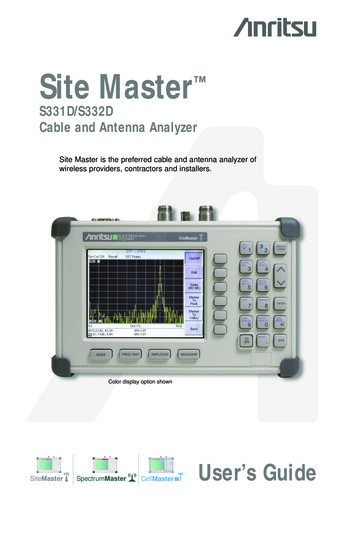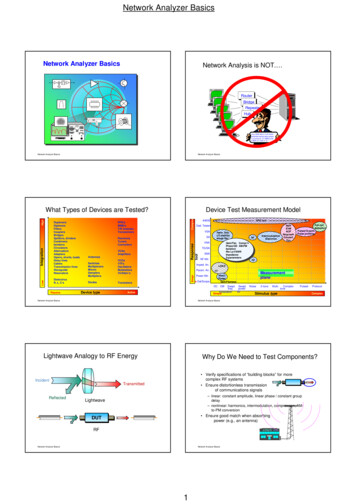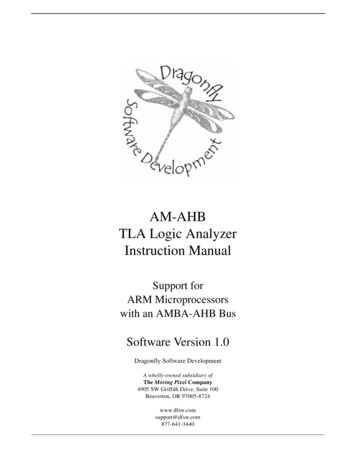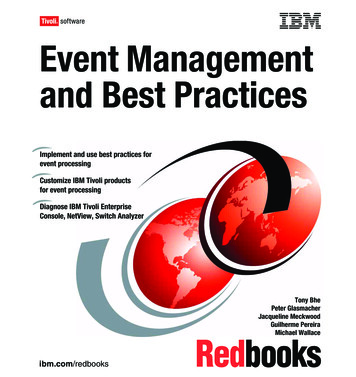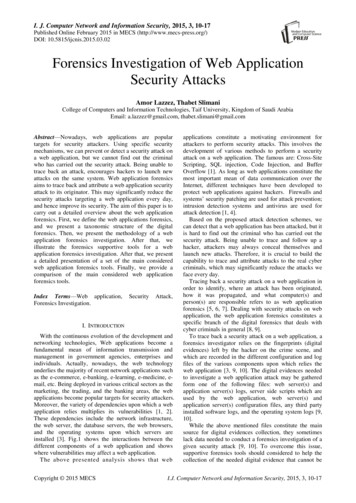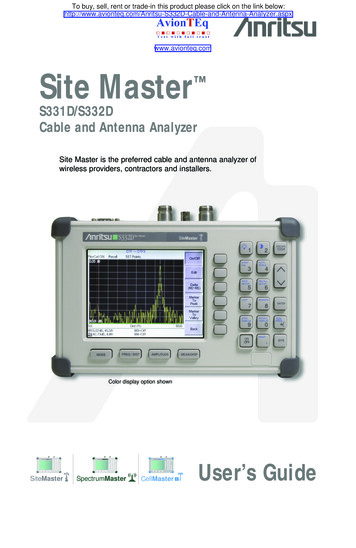
Transcription
EventLog Analyzer:BEST PRACTICESGUIDE 2017 ManageEngine. All rights reserved.www.eventloganalyzer.com
Table of ContentsSystem requirements . 2Hardware specifications . 2Event handling capacity . 2RAM allocation . 2Optimizing hard disk space . 2Required hard disk space . 2Manage database size . 3Manage archive size . 3Securing EventLog Analyzer . 3Installation configuration . 3User configuration . 3SSL certification . 3Database best practices . 4Secure database . 4Optimize PostgreSQL database performance . 4Optimize MySQL database performance . 5Back up database . 5Support best practices . 6Create Support Information File . 6www.eventloganalyzer.com demo.eventloganalyzer.com eventloganalyzer-support@manageengine.com1
This guide details best practices which, if followed, ensure smooth operation and optimumperformance of EventLog Analyzer.System requirementsHardware specificationsThe minimum hardware requirements for the EventLog Analyzer server are a dual core processor and2 GB RAM. Ideally, a quad core processor and 6 GB RAM would provide optimum performance. Thisis because the number of processor cores determines the indexing and search performance ofthe installation. More the number of cores, better the performance of the tool. Running EventlogAnalyzer in VMware is not recommended.Event handling capacityA standalone installation of EventLog Analyzer can handle an average log rate of 20,000 EPS (eventsper second) for syslogs and 2,000 EPS for event logs. To enhance the events handling capacity, adistributed EventLog Analyzer installation with multiple nodes can handle higher log volumes.RAM allocationTo ensure optimal performance, it is recommended not to allocate more than 32 GB of RAM to asingle instance of the ELA Server.Optimizing hard disk spaceThe two main contributing factors to hard disk space are the database and archive files. The database(or index) files contain the most recent log data which can be reported on and searched, while thearchive files contain the older, historic log data. Archive files need to be loaded into the product firstbefore they can be searched or reported on.Required hard disk spaceThe hard disk space required to store logs can be calculated by using the procedure detailed in theperformance optimization guide in the EventLog Analyzer websitewww.eventloganalyzer.com demo.eventloganalyzer.com eventloganalyzer-support@manageengine.com2
Manage database sizeLog data is stored in the database and is periodically compressed and stored among the archive files.The longer the retention period in the database, the greater is the hard disk space needed and lowerthe database performance. The default retention period is 32 days and is configurable (Settings Admin settings DB retention settings). Minimize this value to obtain optimum performance.Manage archive sizeThe archive files are retained for a specific period before being deleted permanently. As they can evenbe stored forever, the size of the archive folder could grow indefinitely. The archive retention period isforever and is configurable (Settings Configuration settings View archived files Settings withSettings Admin settings View archived files Settings). The archive folder size can also bemanaged by assigning a separate dedicated drive as the archive location, or manually transferring thecontents to a tape drive or high capacity storage drive periodically.Securing EventLog AnalyzerInstallation configurationThe operating system user account used to install and run the product must be the same and musthave permissions on all installed folders and subfolders. While it is not necessary for the root accountto be used on a Linux system, on a Windows system, only the default administrator account must beused.User configurationIt is best to change the default passwords for the admin and guest user accounts in the EventLogAnalyzer web client (Settings Admin settings Manage technician)SSL certificationEventLog Analyzer server-client communication can be secured using the SSL (Secure Sockets Layer)protocol. The SSL certification guide offers detailed steps on how to obtain SSL certification.www.eventloganalyzer.com demo.eventloganalyzer.com eventloganalyzer-support@manageengine.com3
Database best practicesSecure databaseFor smooth and seamless installation, EventLog Analyzer makes use of the MySQL or PostgreSQLdatabase default root/postgres user without password. It is recommended to assign a password tothis account in order to further secure the database.This is not needed in case of MS SQL, as a valid user account with credentials needs to be providedduring installation itself.Optimize PostgreSQL database performanceTo optimize performance of the PostgreSQL database:Stop EventLog Analyzer.Navigate to EventLog Analyzer home /pgsql/data/directory.Open the file postgres ext.txt.Replace the existing values of the parameters, with the values mentioned below.Save and restart EventLog Analyzer.ParameterCommentshared buffers 128 MBMinimum requirement is 128 KB.work mem 12 MBMinimum requirement is 64 KB.maintenance work mem 100 MBMinimum requirement is 1 MB.checkpoint segments 15Logfile segments minimum 1 and 16 MB each.checkpoint timeout 11 minutesRange: 30 seconds to 1 hour.checkpoint completion target 0.9checkpoint target duration is 0.0 - 1.0.seq page cost 1.0This parameter is measured in an arbitrary scale.random page cost 2.0This parameter is measured in same scale as above.effective cache size 512MBsynchronous commit offwww.eventloganalyzer.com demo.eventloganalyzer.com eventloganalyzer-support@manageengine.com4
Optimize MySQL database performanceTo optimize performance of the MySQL database:Stop EventLog Analyzer.Navigate to EventLog Analyzer home /bin.Open the file startDB.bat (startDB.sh in case of a Linux machine).Replace the existing value of the parameter "--innodb buffer pool size", with a value suited tothe RAM size of the machine, as given in the table below. For example, if the RAM size is 8 GB,the parameter should be "--innodb buffer pool size 3000M".Save and restart EventLog Analyzer.RAM SizeValue1 GBDefault value (no need to replace)2 GB1200M3 GB1500M4 GB1500M8 GB3000M16 GB3000MBack up databaseIt is recommended to back up the EventLog Analyzer database every fortnight, so that data is not lostin case of any disaster. The database files are located in the EventLog Analyzer home /mysql or EventLog Analyzer home /pgsql folder, as applicable to the build number. To back up the data, stopthe EventLog Analyzer service, and take a copy of all files and folders in the location. This can be donemanually or using any third party back up software. The procedure to back up MS SQL database datacan be found in this link. It is also advisable to keep a backup of the archive files, found in EventLogAnalyzer /archive. If restoring data from a backup, ensure that the build number of the product is thesame as when the backup was taken.www.eventloganalyzer.com demo.eventloganalyzer.com eventloganalyzer-support@manageengine.com5
Support best practicesCreate Support Information File (SIF)When support is required, creating a Support Information File (SIF) to send to the support team(eventloganalyzer-support@manageengine.com) would be helpful and time saving. To create a SIFfrom the web client, go to the Support tab of the product. Click on 'Create Support Information File',wait 30-40 seconds, and click on the Support tab again. Click on download and send the downloadedSIF to the support team, or click 'Upload to FTP Server', provide the required details and submit. If t EventLogAnalyzerHome /server/default/log and upload the zip file in this FTP link.About EventLog AnalyzerEventLog Analyzer is a comprehensive IT compliance and log management software for SIEM. Itprovides detailed insights into your machine logs in the form of reports to help mitigate threats inorder to achieve complete network security. ut ManageEngineManageEngine delivers the real-time IT management tools that empower an IT team to meet anorganization’s need for real-timeservices and support. Worldwide, more than 60,000 established andemerging enterprises — including more than 60 percent of the Fortune 500 — rely on ManageEngineproducts to ensure the optimal performance of their critical IT infrastructure, including networks,servers, applications, desktops and more. ManageEngine is a division of Zoho Corp. with officesworldwide, including the United States, United Kingdom, India, Japan and China.WebsiteTech SupportToll er.com 1-408-352-9254 (Direct)
in case of any disaster. The database files are located in the EventLog Analyzer home /mysql or EventLog Analyzer home /pgsql folder, as applicable to the build number. To back up the data, stop the EventLog Analyzer service, and take a copy o


